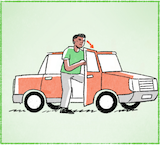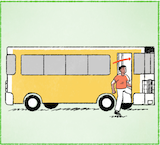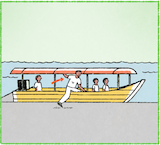


เขากำลังเฮ็ดหญัง กะมีพุซายคนหนึ่ง เขากำลังขึ้นลด ขึ้นลดเก็ง
ลดเก็งคันนี้อาดสิเป็นลดส่วนโตของเขา หลือว่าเป็นลดของเขาเนาะ เขากำลังสิขึ้นไป แล้วกะอาดสิขับไปข้างนอก ขับไปนั้นไปนี้เนาะ
12
เขากำลังเฮ็ดหญัง กะมีพุซายคนหนึ่งเนาะ พุซายเสี้ยสีส้ม กำลังญ่างขึ้น ญ่างขึ้นลดเมหลือว่าลดบั่ดเนาะ กำลังญ่างขึ้นไป
แล้วเขาสิขึ้นลดบั่ดไปใส เขาอาดสิไปตะหลาดตะลี หลือว่าไปในเมียง หลือว่าไปอำเพอนั้น ไปจังหวัดนั้นจังหวัดนี้กะได้เนาะ เขากำลังญ่างขึ้นไป เขากะอาดสิใซ้ลดโดยสาน ใซ้ลดเม ลดบั่ดนี้เป็นพาหะนะไปหม้องนั้นหม้องนี้ หม้องที่เขาอยากไปเนาะ
13
เขากำลังเฮ็ดหญัง มีพุซายคนหนึ่งเนาะ พุซายเสี้ยสีขาว เขากำลังญ่าง ญ่างขึ้นเลีย เขากำลังก้าวขาขึ้นเลีย ก้าวขาลงเลียกะได้
เฮาสิเว้าคำว่า ขึ้น กะได้ หลือว่าสิเว้าคำว่า ลง กะได้ ลงเลีย หลือว่า ขึ้นเลีย กะได้
เขากำลังก้าวขาลงเลียอยู่ตอนนี้
แล้วเขาสิขึ้นเลียไปใส เขากะสิขึ้นเลียอาดสิไปจุดหมายปายทางที่เขาอยากไป อันนี้กะบ่ฮู้ว่าเขาสิไปใส
แล้วแต่เขาเนาะ เขาอยากไปหม้องนั้นหม้องนี้ กะแล้วแต่เขา
แล้วเลียนี้มันอยู่ใส เลียนี้ต้องขี่ในน้ำเนาะ เลียนี้มันต้องขี่ในแม่น้ำใหญ่ๆ หลือว่าแม่น้ำที่บ่ใหญ่ปานใดกะได้ แต่ว่าสามาดเลียขี่ได้เนาะ เลียลงลอยได้เนาะ
Link to overview page
Link to dictionary
| Isaan | Pronunciation | Tones | Thai | English/Notes |
|---|---|---|---|---|
| เขา | khao | M | เขา | personal pronoun: he, she |
| กำลัง | gam-laŋ | M-HR | กำลัง | auxiliary indicating continuous or progressive action |
| เฮ็ด | het | H | ทำ | to do, to make |
| หญัง | ɲaŋ | M | อะไร, เป็นหญัง = ทำไม | 1. what {เขากำลังเฮ็ดหญัง = What is he doing?} {ธูปเอาไว้เฮ็ดหญัง = What are incense sticks for?} 2. something, anything, (nothing) 3. เป็นหญัง[...]คือ in initial position: why {เป็นหญังเขาคือใส่บักพิกลงไปในกวยเตียว = Why is he putting chili in [his] noodle soup?} {เป็นหญังหน้าต่างมันคือเปิด = Why is the window open?} {เป็นหญังมันคือมีควนไฟ = Why is there smoke?} |
| กะ | ga | M | ก็ | 1. then, consequently 2. also |
| มี | mi: | HR | มี | 1. to have 2. there is |
| พุซาย | phu-sa:i | H-HR | ผู้ชาย | man, male |
| คน | khon | HR | คน | person, people |
| หนึ่ง | nʉŋ | H | หนึ่ง | 1. one 2. after adjective: intensifier {บักคักหนึ่ง = very much} {อันบักใหญ่หนึ่ง = very large}, or attenuates the meaning {กะดาดมันแผ่นน้อยๆ หนึ่ง = the piece of paper is [relatively] small} |
| ขึ้น | khʉn | LF | ขึ้น | 1. to go up, to increase 2. sun: to rise {ตะเว็นกำลังขึ้น = the sun is rising} 3. more 4. bus/train etc.: to get on, to board {พุโดยสานขึ้นลดไฟเบิดแล้ว = all passengers have boarded the train} |
| ลด | lot | H | รถ | 1. car, motorized vehicle 2. vehicle, cart {ลดขายแนวกิน = food cart} |
| ลดเก็ง | lot-geŋ | H-M | รถเก๋ง | car (sedan) |
| คัน | khan | HR | คัน | clf. for cars, trains, motorbikes, boats {ลดไฟคันนี้ = this train} {ลดเก็งคันสีเขียวคันน้อย = a small green car} |
| นี้ | ni: | HF | นี้ | 1. this 2. here |
| อาด | a:t | LF | อาจ | 1. might, may, will 2. likely |
| สิ | si | M | จะ | future tense auxiliary {เขากำลังสิตื่น = he's about to wake up} {สิไปตะหลาด = [I'm] going to the market} |
| เป็น | pen | M | เป็น | 1. to be, to exist 2. to be able to 3. to suffer, sth. happens to 4. เป็นหญัง[...]คือ in initial position: why? {เป็นหญังเขากะคือแปงฟัน = Why is he brushing his teeth?} {เป็นหญังเคี่ยงบินมันคือสิตก = Why is the airplane falling down?} |
| ส่วนโต | su:an-to: | H-M | ส่วนตัว | 1. personal, private 2. individual |
| ของ | khɔ:ŋ | M | ของ | of, belonging to |
| หลือ | lʉ: | M | หรือ | or |
| ว่า | wa: | H | ว่า | 1. that, as {คำว่า X = the word X} 2. to say |
| เนาะ | nɔ | H | เนาะ | final particle: makes the statement softer, looking for agreement |
| ไป | pai | M | ไป | 1. to go 2. auxiliary indicating action extending into the future |
| แล้ว | lɛ:o | HF | แล้ว | 1. finished 2. already 3. and then, and next (especially แล้วกะ) 4. auxiliary for past tense |
| ขับ | khap | M | ขับ | to drive, to ride |
| ข้างนอก | kha:ŋ-nɔ:k | LF-HF | ข้างนอก | outside |
| นั้น | nan | HF | นั้น | that, there |
| เสี้ย | si:a | LF | เสื้อ | shirt |
| สี | si: | M | สี | 1. color 2. colored pencil, crayon |
| ส้ม | som | LF | ส้ม | 1. fruit: orange 2. color: orange |
| ญ่าง | ɲa:ŋ | H | เดิน | to walk {เขากำลังญ่างเว้ากัน = they are walking and talking} {ลูกเป็ดญ่างไปนำแม่เป็ด = the ducklings are [walking] following their mother} {เขากำลังญ่างข้ามสะพาน = she's walking over the bridge} {เขาสิญ่างไปใส = Where is he going?} |
| ลดเม | lot-me: | H-HR | รถเมล์ | bus, city bus |
| ลดบั่ด | lot-bat | H-H | รถบัส | bus |
| ใส | sai | M | (ที่)ไหน | 1. where? {สิไปใส = Where are [you] going?} {มาแต่ใส = Where are [you] coming from?} {กะทะอยู่ใส = Where's the pan?} 2. somewhere, anywhere {ใสกะได้ = anywhere, wherever you like} |
| ตะหลาด | ta-la:t | M-LF | ตลาด | market |
| ตะลี | ta-li: | M-HR | ตลาด | alliterative reduplication of ตะหลาด {ตะหลาดตะลี = markets and such places} |
| ในเมียง | nai-mi:aŋ | HR-HR | ในเมือง | downtown, inner city |
| อำเพอ | am-phə: | M-HR | อำเภอ | district |
| จังหวัด | jaŋ-wat | M-M | จังหวัด | province |
| ได้ | dai | HF | ได้ | 1. can 2. to get, to obtain 3. before verb: indicating past tense 4. บ่ได้ + verb: not |
| ใซ้ | sai | HF | ใช้ | to use |
| โดยสาน | do:i-sa:n | M-M | โดยสาร | pertaining to being a passenger {ลดโดยสาน = vehicle for passenger transport, e.g., a bus} |
| พาหะนะ | pha:-ha-na | HR-M-H | พาหนะ | vehicle, means of transport |
| หม้อง | mɔŋ | LF | ที่, แห่ง, บริเวณ | 1. place, area {หลายที่หลายหม้อง = in many places} {หม้องใดหม้องหนึ่ง = some place} 2. clf. for places |
| ที่ | thi: | H | ที่ | 1. that, which {คนที่ยืนอยู่ฝั่งขวา = the person which is standing on the right = the person standing on the right} {เว้าคำที่บ่สุพาบ = to speak words which are impolite = to speak impolitely} 2. for ordinal numbers {ที่สาม = third} |
| อยาก | ya:k | LF | อยาก | to want, to wish |
| ขาว | kha:o | M | ขาว | white |
| เลีย | li:a | HR | เรือ | boat Notes: pronunciation: also realized as เลือ |
| ก้าว | ga:o | HF | ก้าว | to step |
| ขา | kha: | M | ขา | leg {ขาหน้า = front leg} {ขาหลัง = hind leg} {ส้งขาญาว = long trousers} |
| ลง | loŋ | HR | ลง | 1. to descend, to lower, to go down 2. down 3. bus/train etc.: to get off, to disembark {คนกำลังลงลดบั่ด = people are getting off the bus} 4. boat/ship etc.: to get on, to board {เขากำลังญ่างลงเลีย = he's boarding/getting on the boat} |
| เฮา | hao | HR | เรา | 1. personal pronoun: we 2. personal pronoun: I |
| เว้า | wao | HF | พูด | to say, to speak, to talk |
| คำ | kham | HR | คำ | word |
| อยู่ | yu: | H | อยู่ | 1. to be (located) at 2. yet, still 3. auxiliary indicating continuous or progressive action {ทอดปาอยู่ในกะทะ = (in the process of) frying a fish in the pan} {แม่กำลังเมี้ยนเฮียนอยู่ = mother is cleaning/tidying up the house} |
| ตอนนี้ | tɔ:n-ni: | M-HF | ตอนนี้ | now |
| จุดหมาย | jut-ma:i | M-M | จุดหมาย | destination, goal, aim, objective |
| ปายทาง | pa:i-tha:ŋ | M-HR | ปลายทาง | destination, end of a journey |
| อัน | an | M | อัน | 1. thing, object 2. general clf. for objects |
| บ่ | bɔ: | H | ไม่ | 1. no, not 2. question particle, transforming a statement into a question Notes: spelling exception in line with common usage on social media |
| ฮู้ | hu: | HF | รู้ | 1. to know 2. to understand Notes: equivalent to ลู้ |
| แล้วแต่ | lɛ:o-tɛ: | HF-H | แล้วแต่ | up to, depending on |
| มัน | man | HR | มัน | it (also used to refer to people) |
| ต้อง | tɔŋ | HF | ต้อง | to have to, must |
| ขี่ | khi: | H | ขี่ | to ride, to drive {ขี่มอเตอไซ = to ride a motorbike} {ขี่ควย = to ride on a buffalo} {ขี่เลีย = to take or travel on a boat} |
| ใน | nai | HR | ใน | in, within |
| น้ำ | na:m | HF | น้ำ | 1. water 2. drink, soft drink, juice |
| แม่น้ำ | mɛ:-na:m | H-HF | แม่น้ำ | river |
| ใหญ่ | ɲai | H | ใหญ่ | large, big |
| ปานใด | pa:n-dai | M-M | เท่าไหร่, มาก | 1. after negative: (not) very, (not) so much {บ่ใหญ่ปานใด = not so large, not very large} 2. how much, how many {เฮาบ่สามาดนับได้ว่ามันมีหลายปานใด = it's impossible to count how many there are} |
| แต่ว่า | tɛ:-wa: | H-H | แต่ว่า | 1. but 2. only {ฮู้แต่ว่าเขายืนอยู่พุเดียว = I only know that he's standing there by himself} |
| สามาด | sa:-ma:t | M-HF | สามารถ | can, to be able |
| ลอย | lɔ:i | HR | ลอย | 1. to float, to swim 2. to soar 3. smoke/steam: to rise |